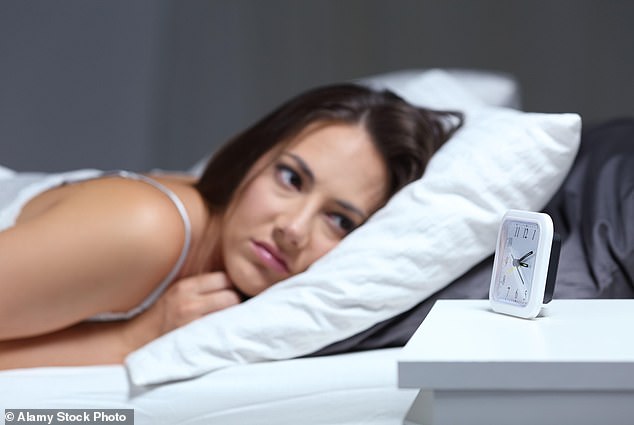Sleep expert explains the reason why you should never sleep naked during a heatwave
With the heat hitting the UK this week, many people will be desperate for a way to cool down as they try to fall asleep.
The sticky, humid British heat doesn’t make for a pleasant night’s sleep, especially if, like most people, you don’t have air conditioning or a strong fan.
In such cases, many of them will opt for easier solutions, such as the birthday suit method: taking off pajamas in the hope of a cooler night.
Speaking with Women’s Health, Sleep expert Sophie Bostock warned that while sleeping naked may be a tempting solution, it could be preventing people from getting the best possible quality of sleep during a heatwave. So sleeping naked should be avoided.
Sophie cited several studies showing that the population gets fewer hours of restful sleep during sultry nights, similar to what recently happened in the UK.
Stock image. Sleep expert Sophie Bostock warned that while it may be a tempting solution, sleeping naked can prevent people from getting the best possible quality of sleep and should be avoided.
According to a recent survey of 2,017 Britons, we sleep 17 hours less in the summer months.
Although more than a third of the population are unaffected by rising temperatures, more than half of British adults sleep six hours or less in summer, compared to just 39 percent in winter.
In fact, the research found that a quarter of respondents had to take days off work because they felt too tired to come to work. With that in mind, Lisa Artis, Deputy CEO of The Sleep Charity, revealed ten top tips to combat the hotter nights.
The reason sleep is so strongly affected by weather is because light, stress, and temperature play a huge role in our circadian rhythm: the body’s natural biological clock that determines when we should be awake and asleep.
This is mainly because the body temperature has to reach a lower value before we can fall asleep, because the sleep-promoting melatonin level increases.
An earlier study agreed that sleep duration is generally shorter when body temperature is still high.
This is because it is harder for the body to regulate its temperature, causing people who feel hot during the night to wake up more often, said Rebecca Robbins, an assistant professor of medicine at Harvard Medical School. Fortune.
As most of us know, a disturbed night’s sleep is never a good night’s sleep. Often people feel groggy and sleepy the next morning. The heat also prevents them from getting a good night’s sleep.

According to a recent survey of 2,017 Britons, we miss out on 17 hours of sleep during the summer months
In order to fall asleep, it is necessary for the temperature to drop. And that is not so easy during a heatwave in the UK.
While some advise people to avoid wearing pyjamas on warm nights to avoid the inevitable overnight overheating, sleep expert Sophie says this can actually cause more damage in the long run, even though it’s not as comfortable.
She told Women’s Health: “This is not really helpful because what you can do is if it builds up on the body and is not being wicked away by a wicking surface – like clothing – it is not helping you cool down.”
Instead, she suggested opting for lightweight pajamas, which can help prevent sweat stains.
“Wearing cotton pajamas, or something else that wicks sweat away from the body, may be better than nothing at all,” she advised.
The NHS advises Britons to get seven to nine hours of sleep every night, meaning we get an average of two nights less sleep in the summer.
Sophie’s advice follows that of a British holidaymaker not to sleep with the air conditioning on after he was admitted to hospital with severe tonsillitis.
Liana Foster from North London travelled to Antalya in Turkey for a family holiday earlier this month.
But just two days later, the 24-year-old woman woke up feeling “groggy” and noticed white spots on her tonsils.
After being rushed to hospital, doctors diagnosed her with a “very serious case” of tonsillitis, a condition in which the tonsils, small glands at the back of the throat, become inflamed.
Ms Foster, a content creator and biomedical scientist, was put on a drip and said doctors told her her condition was “likely” caused by the “mouldy air” from her hotel room’s air conditioning.
She said, “The first night we had it [the air con] very low in the room.
“I think I sleep through my mouth more. It made me sick.”
‘The doctor said it was probably from the air conditioning. They say it could be stale air.
‘I couldn’t take oral antibiotics, so I had to have injections twice a day for three days. I was in a lot of pain.’
The tonsils – two clumps of tissue at the back of the mouth – are part of the immune system’s first line of defense against bacteria and viruses that enter through the mouth, meaning they can easily become infected themselves.
“I’ve had tonsillitis before, but it was never this bad,” she said.
‘If bacteria enter through the throat, they can reach her heart and other organs.’
Liana now wants to warn others to think twice before sleeping with the air conditioning on unless they know it is regularly maintained.
